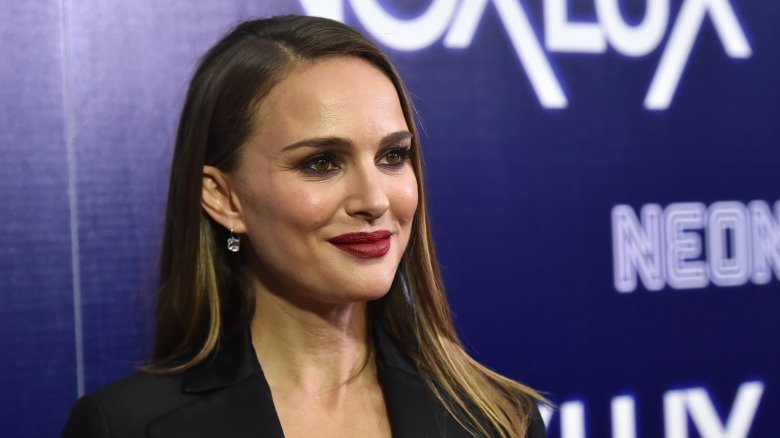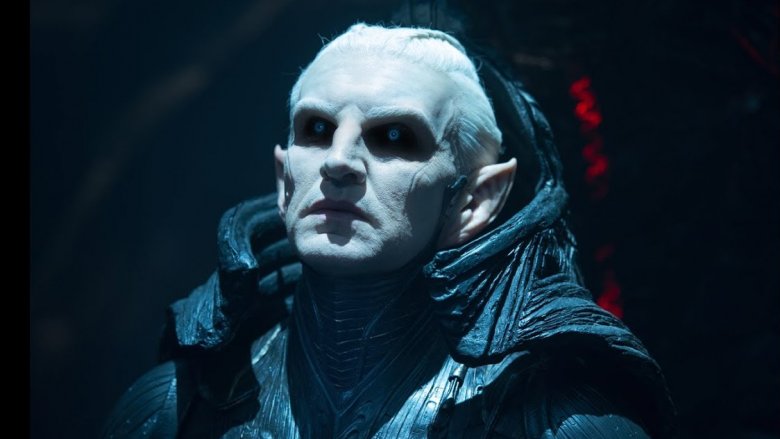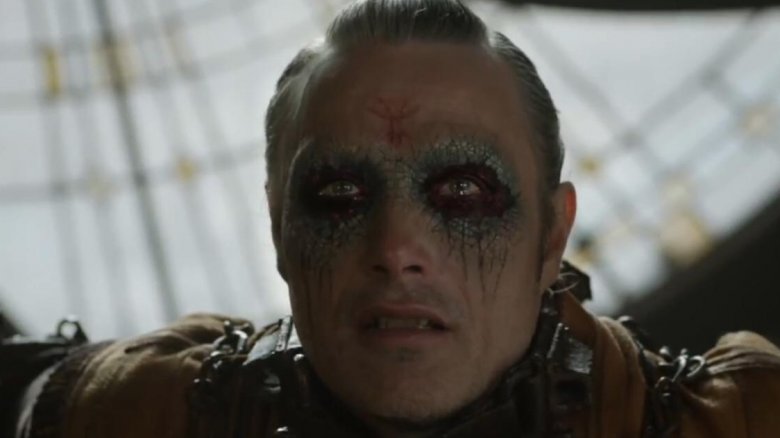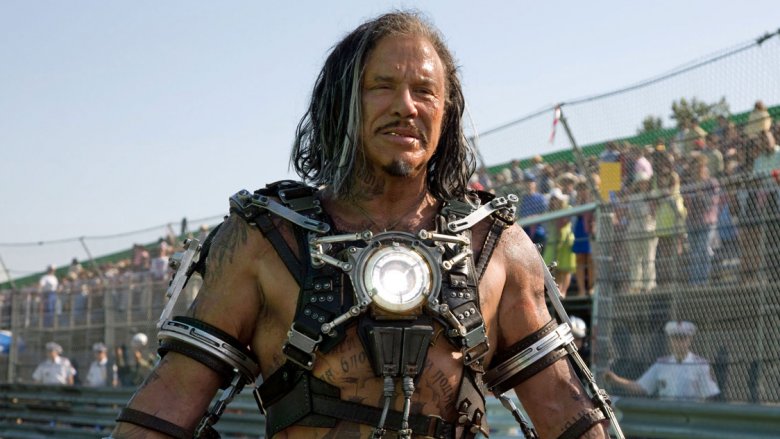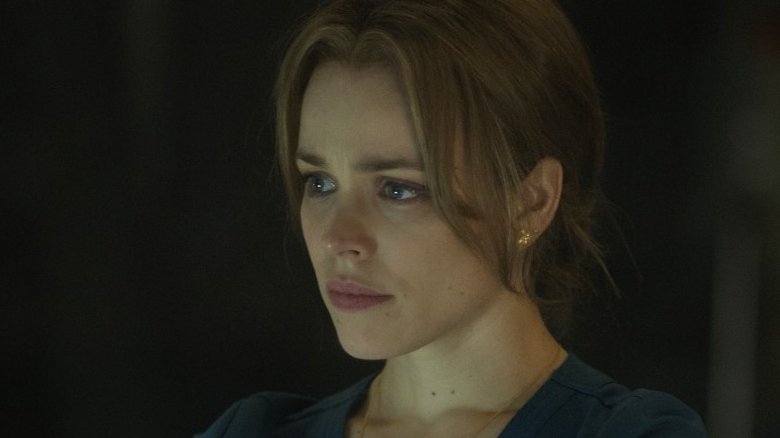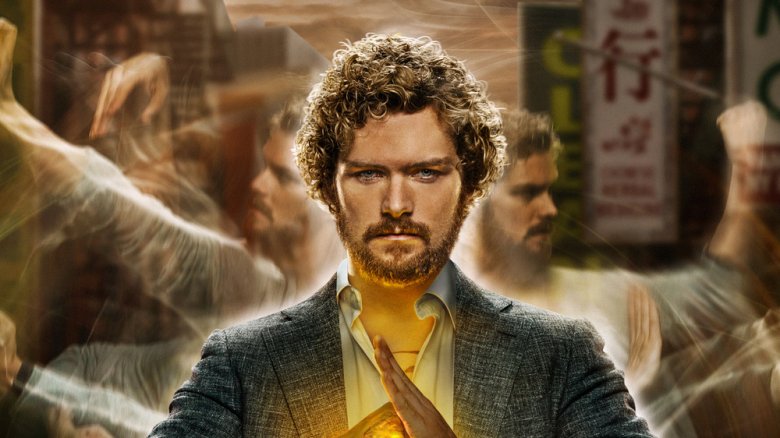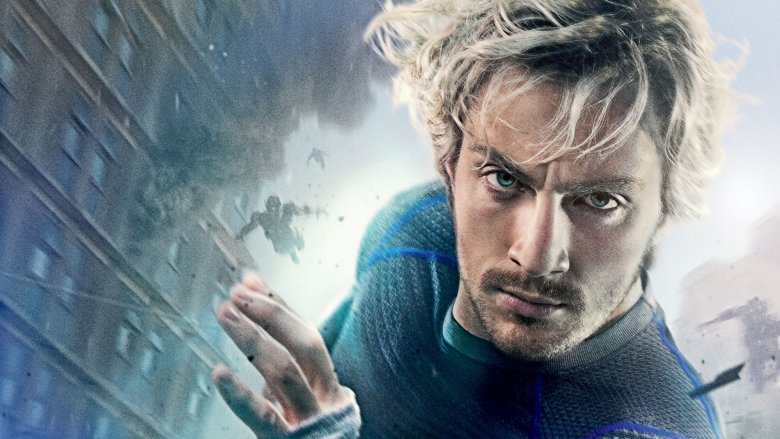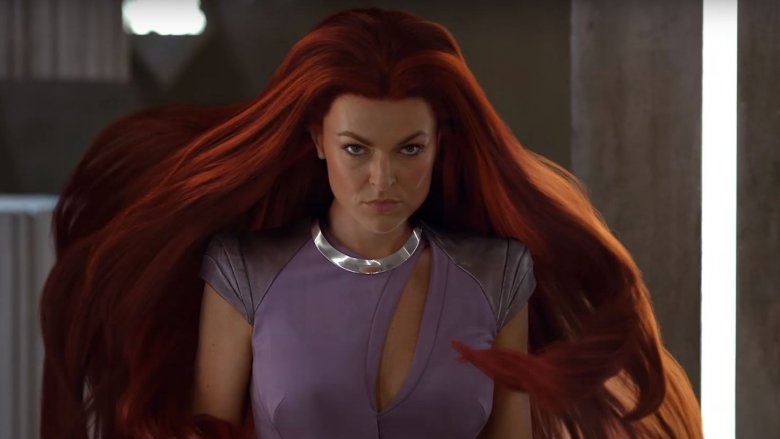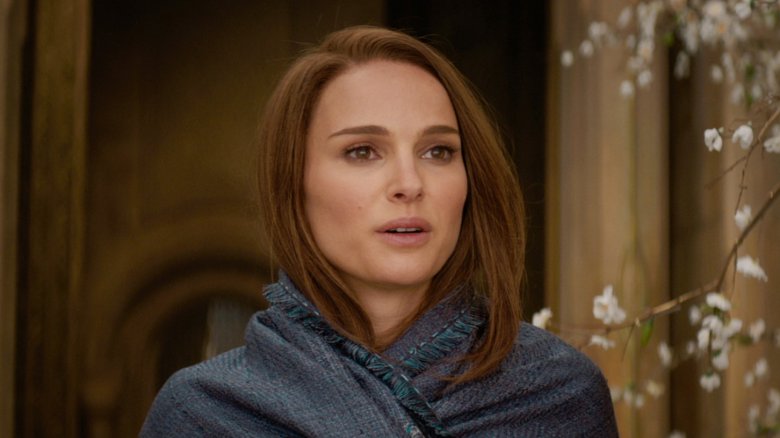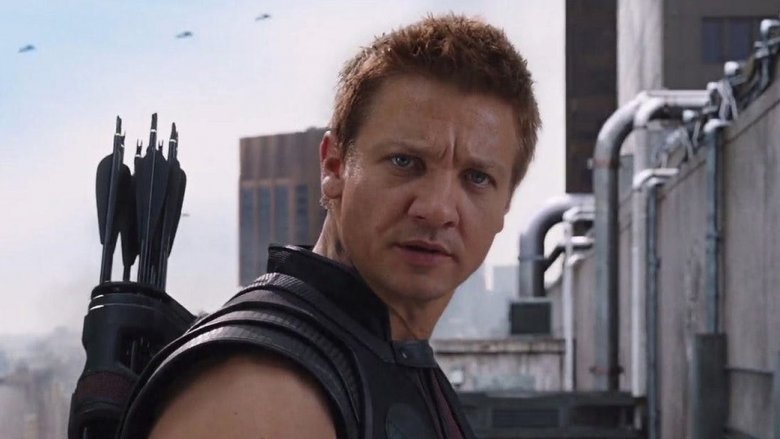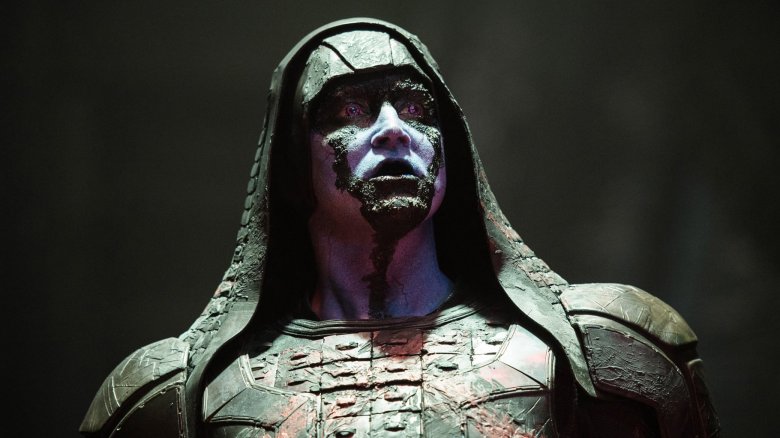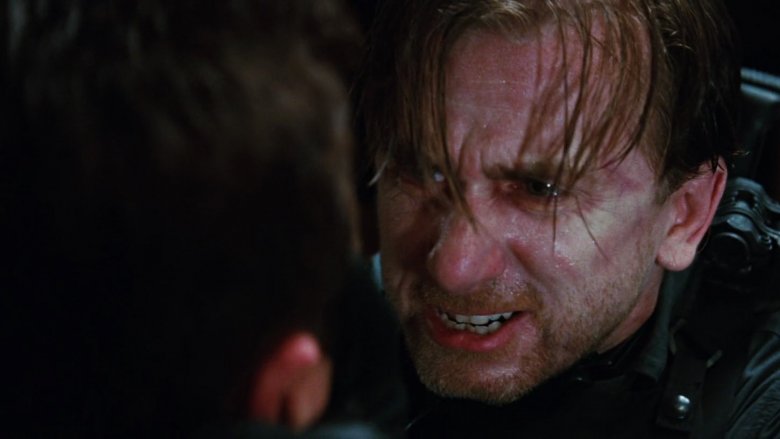The Worst Casting Choices In The MCU
It feels like the entire world is waiting for Avengers: Endgame. It will arrive as Marvel's grand statement of purpose, a cosmic adventure that sweeps all of its many heroes, villains, rogues, and renegades up in its universe-spanning design. There are time-displaced men with a century's worth of scores to settle. There are galactic conquerors to be brought to their knees. There are masters of the mystic arts to be resurrected. Marvel doesn't just rule the cineplex right now — it rules our imaginations.
But it's not all dynamite casting and unforgettable quips. With over a decade of movies under its belt, Marvel's made quite a few bad calls as well. There have been total clunkers of lines, ho-hum battles, and massive miscastings — even when world-class actors have been brought into the mix. You can't win 'em all, it turns out, even when you've managed to get Oscar winners to don tights and talk to bloodthirsty CGI raccoons. Here are the worst offenders, the total disasters, the hugely bungled casting choices of the MCU. Try not to cringe too hard.
Christopher Eccleston as Malekith
Thor: The Dark World is likely one of the most forgotten entries of the MCU. There aren't really any one-liners people love to recall from it, nor any particularly beautifully shot scenes. It can be skipped without impacting one's enjoyment of any other Marvel movie. If it can claim anything, it's creating the low bar every subsequent sequel had to clear, thus rendering the likes of Captain America: The Winter Soldier, Thor: Ragnarok, and Ant-Man & The Wasp utterly golden in comparison. It set up another Infinity Stone, gave Jane Foster and the gang something to do, and brought Loki back, as much as he can be called a creature of any one side. But that's about it.
A huge part of this was Eccleston's limp portrayal of Malekith. Malekith, a dark elf currently at the center of Marvel's "War of the Realms" comic event, is a malevolent trickster with a taste for wicked turnabouts and gleeful cruelty. Eccleston's embodiment reflects none of this. His aims are vague — return the universe to darkness, something about the rightful destiny of the dark elves, standard villain gobbledegook — and his personality is no better defined. If you remember anything, it's his round-eyed mask and elaborately braided hair, and being overshadowed by the costuming department is never what an actor should aim for.
Mads Mikkelsen as Kaecilius
It's hard to waste the smooth, icy Mads Mikkelsen as a villain. From Casino Royale to Hannibal, he's spent most of his career sending chills down audiences' spines. And when the story around him is well-told and acted, that makes it a doubly impressive feat to somehow bungle his character. Solid writers, story, colleagues, and costuming, plus the dude who played Le Chiffre as the villain? How could that possibly go wrong?
Doctor Strange showed us how. Despite the fact that it's a dizzyingly shot, snappily-written origin story, despite how brilliant Benedict Wong and Benedict Cumberbatch are in their principal roles, Mikkelsen's Kaecilius, the magic-user who serves the fiendish Dormammu, is utterly forgettable. Like Malekith, the most memorable thing about his character is the make-up wizardry performed upon him to make it look as though his skin is flaking away beneath his eyes. Beyond that, what, there are a few cool tricks he does with his magic blades? Maybe a quip or two that landed okay? He is totally wasted in the role and entirely overshadowed by the rest of the largely enjoyable movie. At least he's got the rest of his filmography to fall back on.
Mickey Rourke as Ivan Vanko
Mickey Rourke is definitely not forgettable as Ivan Vanko. He positively gobbles up scenery with a spoon, letting the light catch in his gold teeth whenever he can, brandishing his Russian accent like a saber at every scene partner. The cockatoo he so cherishes, perhaps the most memorable thing about the character (after, you know, the electro-whips) was reportedly Rourke's idea. Many entries on this list are here because they are cinematic non-entities, entirely swallowed up in the shadows of other actors, special effects, and the ever-growing tower of MCU worldbuilding. That ain't the case here. Iron Man 2 is widely considered one of the lesser Marvel movies, but if you remember anything about it, you remember Ivan Vanko.
But really... that's not a good thing. Rourke is a bit too present in the role — as an actor, he never disappears into the character. When he asks gutturally about his "bord," the audience can nearly see the effort he's putting in. It's almost entertaining on its own to watch Rourke put so much energy into Vanko, but ultimately, it distracts from everything around it. Years after the fact, you don't recall the family debts the character was trying to repay — you remember the accent, the teeth, the bird, the whips. You remember everything around the character but not the character himself. And in a movie with Robert Downey Jr.'s Tony Stark and Gwyneth Paltrow's Pepper Potts? That's an unforgivable flaw.
Rachel McAdams as Christine Palmer
Quick: remember everything you can about Christine Palmer. If that name doesn't ring a bell, and it probably doesn't, just replace it with "Doctor Strange's girlfriend." Okay, you might reply, she was a doctor too, and there's that one scene they have in a closet together in the hospital, and you're pretty sure you remember the actress from something else. If you did any better than that, you should be commended. Christine Palmer is, effectively, a girlfriend-shaped prop.
This isn't exactly unique — there are a lot of forgettable Girlfriend X roles that able actresses make the best of. But some of them — see Hayley Atwell's Peggy Carter or Zoe Saldana's Gamora — manage to break out and become something more. McAdams' Christine Palmer just stands there, in contrast, present in the hospital and basically nowhere else. Like Kaecilius, the general psychedelia of the movie surrounding her serves to overshadow her completely, and really, that isn't entirely a bad thing. Better to remember the wildly colored Lite Brite planet Strange died on thousands of times than anything about McAdams' performance.
Finn Jones as Iron Fist
If there was ever a moment Iron Fist seemed like a good idea, no one remembers. Its very premise was controversial, as a story about a Western white man who journeys to an exotic and mystical East to become better at exotic and mystical Eastern things than any of the actual people who live there. Then it came out, and on top of its problematic plotline it was, well, milquetoast. Now that it's been officially canceled, the cultural autopsy can be performed, and it reveals that Iron Fist was suffering from all those issues and more. At the core of it? Finn Jones' weak performance.
Danny Rand is transcendentally annoying, and he never quite stops being so. Conceived of as a young billionaire searching to find himself, he is that... and yet somehow, so much more irritating than that description implies. His quest for identity makes him seem too often like a brat at worst, a boring also-ran of a Hero's Journey protagonist at best. When you're not rolling your eyes at him, you're yawning. Anyone else on screen draws your eye (a Colleen Wing show could still work, Marvel!), and you find yourself wishing the show were about them. But it's not, it's about Danny, and that is the series' undoing.
Aaron Taylor-Johnson as Quicksilver
When someone mentions Quicksilver, your mind probably jumps to Evan Peters' zippy, sarcastic portrayal as part of the two most recent X-Men movies. Watching him turn moments of terror into high-speed slapstick performances is an absolute delight, something between a ballet and a Marx Brothers spoof. He's a bright spot in an increasingly dark franchise that no one anticipated, a total joy and surprise. And then, perhaps, you might recall the other Quicksilver: Aaron Taylor-Johnson's staid martyr from Avengers: Age of Ultron.
It's not his fault, really. He couldn't have known he'd end up compared to one of the best things no one expected from superhero movies of the mid-2010s. But the fact is that his take on Pietro Maximoff is, well, unremarkable. He has the right moves, of course, and his tragic death is, well, tragic. But there's a reason Wanda, his sister who has remained a part of the MCU, never seems to bring him up: no one cares. Taylor-Johnson did his job and nothing more. He ran, he quipped, he died. In a movie that contained James Spader, Scarlett Johansson, and Robert Downey Jr., you can't exactly rake the dude over the coals for falling by the wayside... until you remember what another guy pulled off playing the same character in a similarly supporting role with panache and humor. Comparison is the thief of joy, especially when it comes to play cocky speedsters.
Serinda Swan as Medusa
Inhumans was a total flop for which which Serinda Swan can only be partially blamed. Nothing about it worked. The special effects were cartoonish when they weren't outright bizarre, the translation of the Inhumans' fantastical world from page to screen never rose above awkward, and even the best and most experienced members of the cast seemed ill-suited to their characters. It came and went without much of a fuss — few were excited for it, few saw it, and few discuss it now that's done and dusted. It was, simply, a failure.
So no, it's not entirely Swan's fault. But if there is one person who embodies the slow-motion implosion that was Inhumans, it is her. Part of it is her costuming — her wig is atrocious on every level, from its oddly stiff motion to its Ronald McDonald shade of red. Some of it is the absurd situations the writers placed her in. But most of it is the maudlin melodrama she brings to her scenes. There is no moment of Inhumans that more perfectly symbolizes the project's sheer stupidity than watching Swan deliver a drawn-out, feral-cat-in-the-alleyway yowl as her hair is shorn by the fiendish Maximus. It's meant to be a moment of cruelty, but it is straight-up hilarious to watch her swoon at the touch of a decidedly unfantastic pair of electric clippers. Nothing can stop the Inhumans, apparently, except a hasty haircut.
Natalie Portman as Jane Foster
Natalie Portman is an incredible actress. Every year, she manages to find some new, path-breaking role to add to her repertoire. Brash, cynical pop icon in search of a comeback? Crazed ballerina descending into the darkest depths of perfectionism? A beloved and bereaved first lady in the midst of one of the 20th century greatest crises? She's got you covered. Oh, and she also went to Harvard, speaks multiple languages, and created one of the most viral SNL skits of the last twenty years. Portman gets the job done.
Jane Foster is, really, one of her only true failures. She gives it the old college try in the first Thor movie, injecting Foster with a pale sort of intelligence and energy at the prospect of wormholes and other dimensions. But even then, her heart was clearly not in it, and by the time Thor: The Dark World rolled around, it was hard to deny that she had checked out. Jane just doesn't seem very connected to the world around her, let alone the developments happening within it, and the performance fades, especially in comparison to any of her other roles. You can't win 'em all, but if you're Natalie Portman, you can comfort yourself with your Oscar... and the fact that at least this time, the flop didn't involve Jar-Jar Binks.
Jeremy Renner as Hawkeye
Renner had a tough job from the beginning when it came to playing Hawkeye. The way this iteration of Clint Barton is written doesn't often line up with any previous version of the character, nor the then-current "Hawkguy" take by Matt Fraction and David Aja that went on to become a fan favorite. He had to play a character with a history that mattered, but was also going to end up largely ignored. Even the most celebrated, award-laden actor in the world would have had trouble with that. How do you make the guy with the arrows look cool? How do you even make him look like he deserves to be there in the first place?
Unfortunately, years after his debut in 2012's The Avengers, the writing is on the wall: Renner's Hawkeye just isn't that good. He's not bad either, exactly, but he is unquestionably the least memorable Avenger and the one with the fewest fans. He's not as funny as Tony. He's not as noble as Steve. He's not as conflicted as Natasha. He's a watered-down version of all of them, minus the powers and tech. His upcoming series, co-starring beloved protege Kate Bishop, might be able to turn that around, but as it stands, Hawkeye is a ho-hum also-ran we'd all like to see go back to his farm and stay there.
Lee Pace as Ronan the Accuser
It seems likely that people will forget this as time wears on and the Marvel Universe continues to snowball billions upon billions of dollars, but there was a time when people laughed at the idea of a Guardians of the Galaxy movie. Who'd ever heard of the Guardians apart from hardcore comic geeks? What was up with the talking raccoon? Did they really expect people to go along with an animate tree who could only say "I am Groot," let alone buy t-shirts, coffee mugs and backpacks bearing his image?
As we all know now, Guardians of the Galaxy became a huge hit and a pillar of the modern MCU. But as much as we love Star-Lord and his merry band of misfits, we don't really care much for the movie's bad guy, Ronan the Accuser. It's no surprise why: he's exceptionally boring in a movie that is anything but. He's mad about space warfare that the audience has no real stake in, carries a giant hammer, wears dramatic eye (and chin) liner, and... that's pretty much it. When he showed up again in Captain Marvel, Marvel made sure he was toting his hammer in every shot, lest we forget who he was. And who could blame us for doing so? If we remember Ronan for anything, it's for being beaten in a galactic dance-off.
Tim Roth as Emil Blonsky
Emil Blonsky is an elite soldier who becomes Abomination, the endpoint of the darkest path Bruce Banner could take. Nothing stops him from gobbling up power — he has no kindly girlfriend, noble attitude, or passion for science. He just wants to be bigger, better, and burlier. His fight against the Hulk is a spectacular one in which, as Banner goes on to sheepishly recall in The Avengers, they "break Harlem." Cool, right? Banner versus a grim reflection of himself, power against the looming specter of corruption, two giant man-beasts fighting to the death. It's the big, broad drama that makes superheroes, as a genre, so recurrent. It's about the death-defying heroics, but it's also about the human struggles we all face.
And yet, despite the the memorable climax, Tim Roth as Blonsky simply fails to deliver. One wonders if, had the stars aligned to make this early effort more like the MCU we know now, all that potential could have been actualized the way the Hulk deserves. But it wasn't. Roth never gets to the core of his conflict with Banner, nor the nature of his own evil. He's just a bad guy, doing bad things for the sake of it. This gleeful, one-note evil can still lead to great cinema — Willem Dafoe as the crazed Green Goblin comes to mind — but that is very much not the case in The Incredible Hulk. Roth does what he has to do, and absolutely nothing more.
